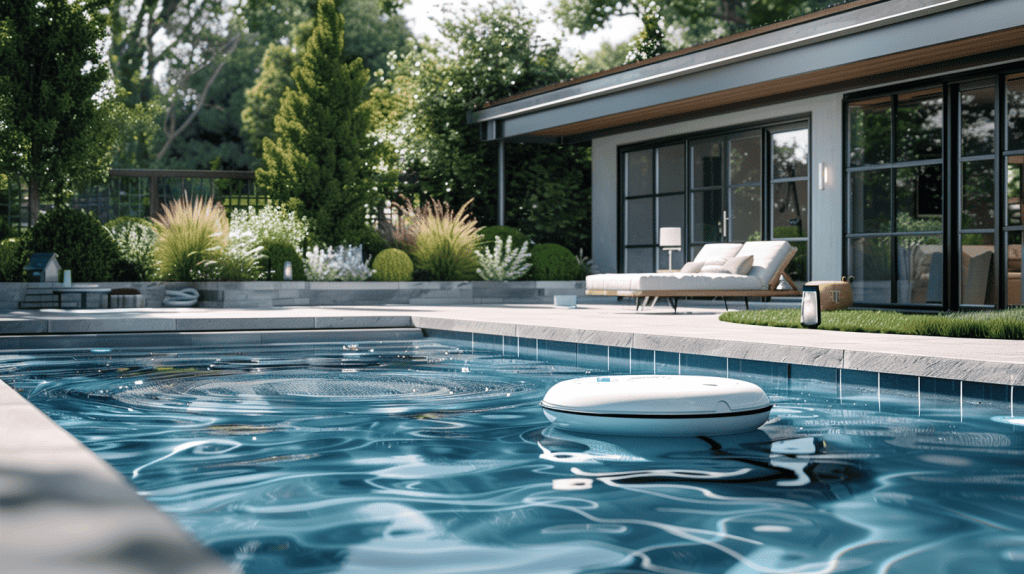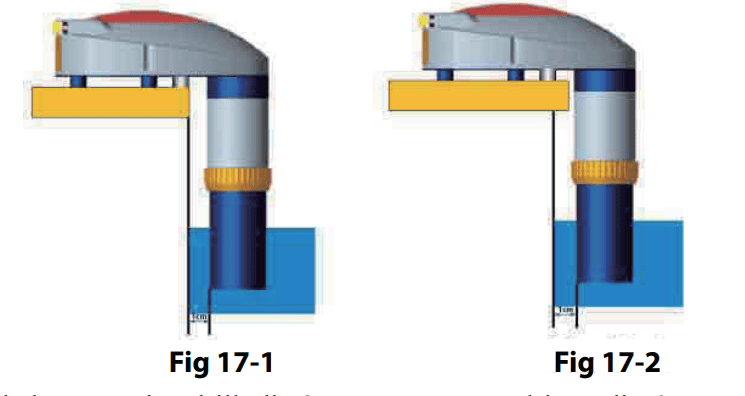A pool alarm system with a remote receiver in your home will quickly alert you if someone goes into your pool area when they shouldn’t. This system has different sensors: surface wave sensors that pick up any splashes or ripples in the water and subsurface sensors that monitor movements below the water’s surface. There are also gate sensors that will let you know if the pool gate opens unexpectedly. Make sure to check the local laws to ensure you’re following safety regulations.
When you set up the system, place the receiver where it can work best, usually within 200 feet of the pool, to ensure it stays connected. Regularly checking the batteries and testing the system to keep it working well is also a good idea. By learning more about these systems, you can improve your pool area’s safety and legal compliance.
Key Takeaways
- Home remote receivers allow monitoring of pool alarms from within the house.
- Ensure the receiver has a wireless range adequate to cover the distance to the pool.
- Receivers with long-lasting batteries provide uninterrupted monitoring.
- Installation involves positioning the receiver within 200 feet of the pool for effective communication.
- Regular maintenance of the receiver and pool alarm ensures reliable functionality and safety.
Understanding Pool Alarm Technology

Pool alarm technology utilizes sensors to alert you immediately if someone or something enters your pool without permission. Different sensor types are vital in this technology. Surface wave sensors detect any surface disturbances, while subsurface sensors monitor movements in the deeper parts of the pool. There are also gate sensors, which activate if a pool gate is opened unexpectedly.
You should be aware of varying alarm regulations depending on where you live. Many places require pool alarms for homes with children, and specific standards may dictate the type of alarm system you need. For instance, some regulations might require alarms that detect objects as light as 15 pounds to ensure the safety of small animals and children.
It’s essential to check local codes to make sure your pool alarm meets legal requirements. These rules aren’t just bureaucratic hurdles; they’re designed to enhance safety and prevent accidents. You can greatly enhance security and peace of mind by staying informed about these regulations and choosing the right sensor types for your pool. Ensure your system is properly maintained and checked regularly to keep it functioning correctly.
Key Benefits of Pool Alarms
Understanding the regulations and types of sensors, you’ll find that installing a pool alarm system offers significant safety benefits. These systems are designed to alert you immediately if someone enters the pool area unattended, which is essential for preventing potential accidents, especially involving children or pets. By staying compliant with legislation, you’re adhering to safety regulations and potentially reducing your liability in case of accidents.
Pool alarms provide substantial safety enhancements. They serve as an early warning system, allowing you to react swiftly to any unforeseen incidents. This can be particularly reassuring if you have young kids or host gatherings where attention might be diverted from the pool. Knowing you’ll be alerted instantly helps you maintain peace of mind.
Many regions have specific laws that require pool alarms. Following these laws isn’t just about obeying rules; it’s also about making your swimming area safer. Sometimes, having a pool alarm can even get you discounts on homeowners insurance. This is because having a pool alarm reduces the risk of accidents and drownings.
Features of Home Remote Receivers

While considering a pool alarm system, it’s important to explore the features of the in-home remote receivers that enhance monitoring and response capabilities. The wireless range of these devices is a key feature, as it determines how far you can be from the pool while still receiving alerts. Typically, you’ll find that most receivers have a substantial range, allowing you to move freely around your home or yard without losing the connection to the sensor.
Another vital aspect is the receiver’s battery life. You don’t want to frequently change batteries or find the receiver dead in a critical moment. Most modern units are designed with long-lasting batteries, but checking the expected battery life before purchasing is wise. Additionally, many models feature a low battery indicator, ensuring you’re aware well before the power runs out.
These features collectively contribute to a robust system that keeps you informed, no matter where you’re in your home, providing peace of mind that the pool area is monitored. Remember, the effectiveness of a pool alarm system significantly depends on these capabilities, so it’s important to choose a receiver that matches your lifestyle and safety requirements.
Installation and Setup Guide
Follow this simple installation and setup guide to guarantee your pool alarm system operates effectively. First, check the receiver’s compatibility with your existing pool systems. The receiver and the alarm must be fully compatible to ensure seamless communication.
Start by positioning the receiver within a good range of the pool alarm and where it won’t clash with your home decor, keeping alarm aesthetics in mind. It should be placed within 200 feet of the pool alarm unit to maintain a strong signal.
Mount the pool alarm itself on the edge of the pool according to the manufacturer’s instructions. Ensure it’s secure and stable; this will prevent false alarms and ensure it functions correctly. Connect any wires or sensors as directed, typically involving simple plug-in connections or basic wiring.
Once installed, test the system to confirm that the alarm and receiver communicate effectively. Activate the pool alarm using the test mode feature and listen for the alert on the receiver. If you don’t hear the alarm, check the connections and settings, and adjust the receiver’s position if necessary.
Remember to consult the user manual throughout installation for specific details about your model. This will help you troubleshoot initial hiccups right after setup.
Maintenance and Troubleshooting Tips

Routine maintenance guarantees that your pool alarm system stays reliable and minimizes the chances of malfunctions. You’ll need to check and possibly replace the batteries regularly. Battery replacement isn’t just about keeping the alarm powered; it assures the system’s responsiveness and efficiency. Typically, batteries should be checked every season or following the manufacturer’s guide.
Signal interference can be a pesky issue. Ensure that large metal objects or electronic devices aren’t too close to your pool alarm or remote receiver. These objects can disrupt the signal, causing your system to perform inconsistently. If you suspect signal interference, try relocating the receiver or the interfering object and test the system again.
Remember to clean your pool alarm and receiver. Dust, water spots, and debris can affect the sensor’s sensitivity and the receiver’s functionality. Use a soft, dry cloth to wipe down the equipment gently. Avoid harsh chemicals or abrasive cleaners, as they can damage the components.
A reset might fix the issue if you’re encountering false alarms or your system isn’t responding. Consult your user manual on how to reset your device, as procedures can vary by model. Regularly testing the system ensures it’s always ready to alert you in case of an emergency.
Frequently Asked Questions
Can Pool Alarms Be Integrated With Smart Home Systems?
Sure, you can connect pool alarms to your smart home system, but it might be tricky depending on the brands and technologies you have.
Are Pool Alarms Pet-Friendly?
Yes, pool alarms can be pet-friendly, but you must consider pet sensitivity settings during installation. By following the guidelines, you can ensure the alarm won’t trigger unnecessarily while keeping your furry friends safe.
Is there a warranty for pool alarm systems?
You’ll find that most pool alarm systems come with a warranty. Check the warranty length and transferability options when purchasing to make sure you’re covered in case of any issues or ownership changes.
How Do Extreme Weather Conditions Affect Pool Alarms?
Extreme weather conditions can severely affect your pool alarms. Temperature impacts and fluctuating conditions may compromise sensor reliability, making it less effective in detecting intrusions or disturbances in your pool area.
Can Pool Alarms Distinguish Between Objects and People?
You’re wondering whether pool alarms can tell the difference between objects and people. Advanced sensor technology has improved their detection accuracy, but it’s not foolproof—some systems might still confuse objects with humans.


